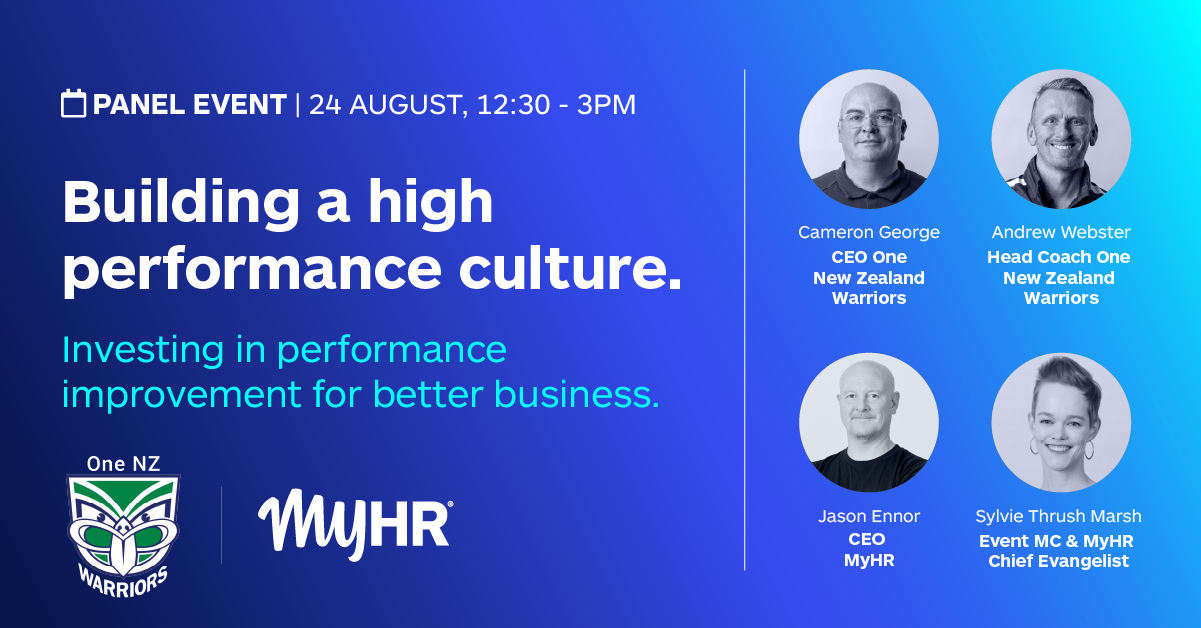We were stoked to partner with the One NZ Warriors in August 2023 for an honest, practical, and inspiring event looking at building a high performance culture. Andrew Webster (Head Coach of the One NZ Warriors), Cameron George (CEO of the One NZ Warriors), and Jason Ennor (CEO of MyHR) joined us to share their learnings and advice.
Our panel discussion ranged from the importance of physical space for building culture, to building faith and confidence in a team when they’re down, and the importance of hiring and retaining the right people for your business.
In this blog we cover the key takeaways from the day, and you can also watch the full recording of the event for free here.

1. Understand your drivers of performance
Andrew Webster's emphasis on well-defined goals and non-negotiables highlights their role in driving performance and fostering clarity and purpose within the organisation.
He explains how this works for the NRL team:
“We broke it down – what’re the four most important things to master in order to win? What’re the non-negotiables that are fact, not opinion? Completion is one of them. So what do we need to practise, every day, to be the best in the league at holding onto the ball? If you’re practising that 80% of the time, in my opinion, you’re going to be successful. Everything outside of that is extra detail.”
2. Good people make you a good leader
Cameron’s advice was clear - "If you have good people, you’ll be a good leader. I cannot stress that enough".
A culture of excellence thrives on the strength of its members. When the people you surround yourself with share your values and objectives, the collective impact is transformative. The careful curation of your team is the bedrock upon which your culture stands.
3. Build an understanding of the team before making changes
When addressing cultural or performance opportunities, informed decision-making and a considerate approach to transformation are key.
Andrew describes how he didn’t want to bring in additional resources, like a sports psychologist, or change the approach until he knew what he was working with.
“I said ‘I can’t commit to that until I get into working with the players’.”
4. Start with something that works
Especially if you’ve inherited a team, or you’re coming off the back of a difficult time, you first have to get your team to believe in themselves.
Andrew spoke about how a relentless focus on execution started to show results in the team’s performance, and after 6 or 7 rounds in the early stages of the season, the team started to believe that they could do this.
“Everyone in the media was saying that the team wasn’t good enough, and I started hearing the players say ‘we’re not good enough’. That was the first thing that had to change.”
Small victories build confidence and commitment, setting the stage for more substantial achievements in the future.
5. Balance the 'tried and true' with tailoring
Recognise that, while some strategies may be universally applicable, adapting and tailoring approaches to meet the unique needs of your organisation is essential for relevance and success.
Andrew agrees that copy and pasting approaches usually don't work.
“You’ll learn some things that you can take to any organisation that you work in, but some things you can’t. You need to learn what people’s strengths are, what their weaknesses are, and what they need right now.”
6. Get out of the way of your team
Unlike many businesses, in a sports team the CEO is often the least-equipped to provide technical or practical direction. Cameron explained "It’s not my place to tell coaches how to coach, or strength and conditioning coaches to build a strong team”.
Effective leaders empower their teams by providing the autonomy and responsibility to execute their roles. This empowerment cultivates a sense of ownership, accountability, and dedication among team members, fostering an environment where they can thrive.
7. Enjoyment and safety drive improvement and performance
Andrew Webster's recognition of the role of enjoyment and safety in enhancing performance is profound, as he states, "If you’ve got enjoyment and safety at work…people will naturally start to work harder, they’ll naturally start to get better at their craft."
A positive and secure work environment not only encourages employees to invest their best efforts but also fosters a continuous drive for growth and development. A culture of excellence thrives in an environment where individuals feel secure and fulfilled.
In such a setting, employees naturally strive for continuous improvement, pushing the boundaries of their capabilities.
8. Psychological safety is a necessary, not a nice-to-have
Ensuring a safe work environment, as emphasised by Cameron George, is a non-negotiable aspect of responsible leadership. It's essential not only for the physical well-being of employees but also for their mental health and emotional security.
9. Celebrate the wins
All three speakers agreed that celebrating the wins was important. Andrew spoke about how “we can’t ignore or forget how we got here, and we should celebrate that”. Such celebrations can elevate morale and motivation throughout the organisation, fostering a culture of recognition and appreciation.
10. Talent is not enough
Talent is one thing, but being part of a team is another.
“Everyone has talented people in the building. It’s one thing to have talent, but if you want to be an elite player and play in a championship team, you’re going to have to work together” is how Andrew describes the relationship between talent, teamwork, and performance.
11. Cultivate honest discussion and reflection
Cameron George's encouragement of leaders to promote honest feedback and accountability is a cornerstone of a healthy organisational culture.
“A lot of leaders feel like honest feedback is when you’re giving your team feedback, but the real honest feedback is when they give it to you too.”
Fostering an environment where team members trust one another and provide constructive input is pivotal for growth.
Andrew agrees. “[Building a culture where people feel comfortable giving and receiving feedback] doesn’t happen overnight, but if we can’t give and receive feedback from people who care about us, and want to help us get better, what’re we doing here? It comes back to feeling safe with each other, trusting of one another, and being able to give each other feedback in a way that makes them feel like you’re still on their side.”
12. Put people in a position where they play to their strengths
Andrew Webster's emphasis on recognising individual strengths and aligning roles accordingly highlights the role of strategic talent deployment in optimising productivity and fostering job satisfaction.
Unlike other teams in the NRL, they don’t have an attack coach, or a defence coach. Instead, he took the time to understand what each coach was good at – one was excellent working with forwards, another with backs, and Stacey Jones is strong in kicking and managing the transitions of the game.
“I said, let’s not complicate it, this is what you’re good at, so we’ll get you coaching and working with the boys on that.”
13. Pay attention to your physical space
In what he describes as “the single change that’s had the biggest impact”, Andrew spoke about the importance of paying attention to the physical space and foot traffic that your team operates in.
“Create an environment where your team, the people you’re responsible for, walk past you every day, and you can take the temperature of the room.”
An holistic approach to workspace design that enhances team dynamics and performance will pay dividends.
14. Never close your door
Andrew described the week that he closed his office door to get some work done as “the worst week of coaching I’ve ever done”. Being visible, accessible, and connected as a leader means that you will have a far more effective, and long lasting, effect on the culture of your team. Inviting dialogue, innovation, and idea sharing are cornerstones of effective leadership.
15. Get the dirty water off your chest and then move on
Cameron described working with a sports psychologist to facilitate an all-hands session with everyone at the club when they returned from Australia after the COVID-19 restrictions ended.
“You can criticise me, you can criticise the club, you can say whatever you want – but we are not going back downstairs until we’ve got everything we need to say off our chests” was the invitation to participants.
Describing the experience as “vastly more positive than negative”, Cameron explained that the sports psychologist later commented that he was surprised more businesses didn’t do this!
Understand that your employees are people first, and colleagues and employees second. Give them space to be heard, to share their frustrations and disappointments, and then move forward knowing that these issues have been put to bed.
16. Move anyone not rowing in the same direction out of the waka
Prioritising cultural fit over individual talent is pivotal. Toxic influences can corrode the entire team's spirit and performance, underscoring the importance of maintaining a cohesive, values-aligned unit.
Andrew and Jason agreed, with Andrew noting that “it’s not that they’re a terrible person, but if they’re not going in the same direction…when that person’s gone, we’ve noticed a real impact on the way that we play, and the way that we train."
17. Build your team with an eye to the future
Jason Ennor's emphasis on nurturing young talent for long-term success underscores the importance of strategic talent management in building a resilient and enduring organisation.
“[Balancing today’s needs with future needs is] the role of a leader. It’s easy to build a team for one project, one event, one season – it’s much harder to do that in the long term. When you’ve identified your young talent, and trust that they’ll have a role to play in the future, it’s critical to nurture them.”
Check out the full recording of the event for free here.




